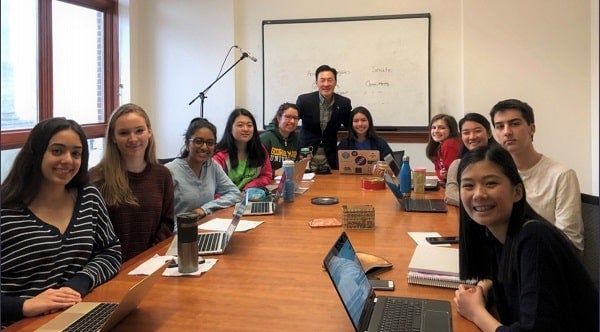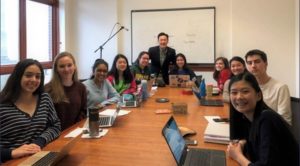Students leading the fight for solar

Aditi Iyengar, is a Virginia high school student and member of FCPS Solar on the Schools
198 schools. 180,000 students. The 10th largest school district in the country.
Fairfax County Public Schools (FCPS) needs a lot of energy. Yet only 1% of that is renewable—and FCPS produces close to 150,000 tons of greenhouse gas emissions. They have fallen behind other school systems in Virginia and around the nation when it comes to the implementation of renewable energy. The mission of FCPS is to “inspire and empower students” to lead “healthy, ethical lives,” but how can students do so when air pollution and severe weather threaten to increase disease and shorten our lifespans?
How we’re fighting for solar on our schools

In 2015, a group of high school students grew tired of our school district sitting idly while the burden of climate change fell on the younger generation. They founded FCPS Solar on the Schools, an organization that started off as a ragtag group of students and has grown into a multi- school coalition that I joined last year. We’ve been able to make considerable progress, consistently lobbying the school board to issue a Solar Power Purchase Agreement, which will result in a contract that can be used by other government buildings and school systems once it is awarded. We demanded stronger commitments to renewable resources, and the school board passed its Resolution on Climate Change Action, calling for “the rapid replacement of fossil fuels with renewable energy.” The Capital Improvement Program FY 2020-2024 included the commitment to solar by the Fairfax County government as well.
It hasn’t all been smooth sailing. I remember one school board meeting where I watched board members come to an agreement to investigate the feasibility of solar for FCPS. Listening to statements from our supporters, as well as those from strong dissenters, I felt gratified to finally be listened to. I also fully understood for the first time what we were up against. The sad fact is there are still climate change deniers in politics nationwide, and they can’t be ignored while they’re still in office. When dealing with that perspective, it’s important to emphasize that solar makes sense economically as well as environmentally. Yet another challenge comes from remnants of the old solar landscape—ideas of large upfront costs and unreliability—continue to prevent people from recognizing the economic feasibility of solar.
In reality, technological advancements have made solar panels today cheaper than ever. Solar is extremely viable for schools due to alternate methods of financing, like power purchase agreements, or PPAs. With a PPA, the school buys the power generated by the photovoltaic system at a fixed price. The panels themselves are financed, owned and maintained by the solar company for the duration of the contract period. PPA contracts usually last 10-20 years and provide protection against fluctuating prices of the utility. On top of this, PPAs owned by a third party allow school systems to take advantage of the federal tax credit for solar. All of this adds up, or rather, subtracts—for example, Arlington Public Schools’ 2018 award has them paying less for their solar PPA than what they currently pay the utility.
What’s next for FCPS Solar on the Schools
For FCPS Solar on the Schools, despite our accomplishments, the work’s not over yet. Unfortunately, Dominion Energy has placed a limit on the amount of solar power that can be acquired using PPAs. With the price of solar decreasing, and many counties across Virginia in the process of installing solar, that limit may be reached in 2019. Our next step is to campaign for the passage of the Solar Freedom bill at the Virginia General Assembly, which will raise caps on solar installations and net metering, in addition to removing other restrictions for all types of customers. This piece of legislation will break barriers to create a freer, stronger market for solar in Virginia. While the bill came up short in 2019, we hope to keep fighting for good solar policies in the future.
We want to take the solar initiative nationwide. Students across the nation should start their own coalitions of passionate, driven young adults, and consistently demand more from their local representatives. The key to success is constant pressure. While issuing a commitment to solar is a major step, we need to hold the county accountable throughout the entire process to ensure that they keep their promises. For our earth, for our communities, and for our futures, we as students have banded together to put solar on our schools. We hope that you’ll join us.
You can follow us on Instagram @solarfcps, and text @solarfcps to 810-10 to find out more on how you can support FCPS Solar on the Schools. Feel free to get in contact with us anytime by emailing solarontheschoolsfcps@gmail.com!
